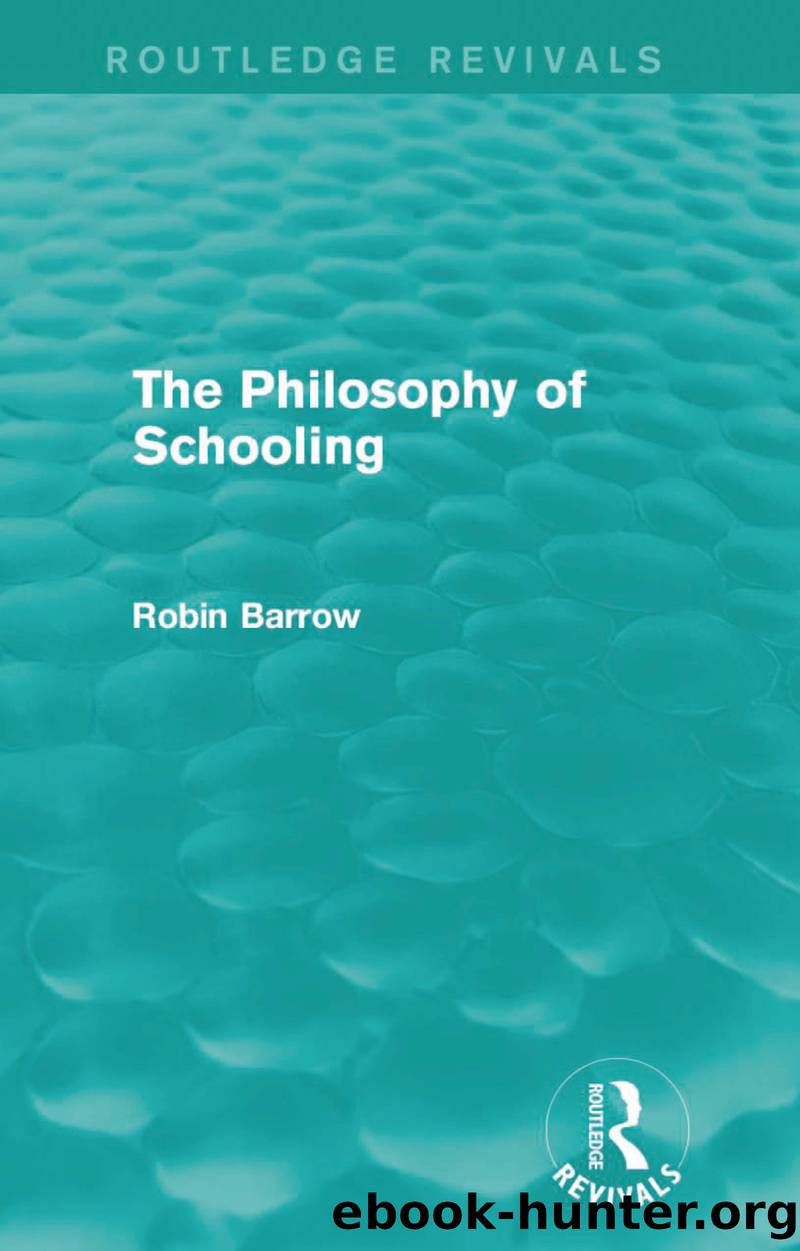The Philosophy of Schooling by Barrow Robin;

Author:Barrow, Robin;
Language: eng
Format: epub
Publisher: Taylor & Francis Group
Published: 2015-08-15T00:00:00+00:00
4 Curriculum Content
DOI: 10.4324/9781315683577-4
1 Subject Divisions
We have established that there should be a core curriculum and that its broad framework is a matter for the state to decide. But that does not prevent us considering the matter here and offering some reasoned considerations about the content both of the core and of the wider curriculum. The state has the final authority and responsibility, but it is to be hoped that it will exercise that responsibility in the light of careful reasoning. Firstly, it is necessary to consider two frequently encountered but usually unexplained remarks about school subjects in general: that the school curriculum is too academic and that subject divisions are arbitrary.
Is the curriculum too academic? What does the charge mean? The man in the street probably thinks of the academic in terms of mental as opposed to physical activity: the more you sit on your backside and reflect the more academic you are; the more you get out and do something, the less so. The dictionary definition of âacademicâ is a stringent one. It says that it means âpurely theoretical, unpracticalâ. If âtheoreticalâ is taken to mean âspeculative and not yet established by experience or experimentâ (again I follow a standard dictionary) as a particular view of the origin of the world may be said to be theoretical, then few, if any, typical school subjects are purely theoretical. If it is taken more loosely to mean âconcerned with the underlying principles or the rationale or the background to some practice or practicesâ, as one may be more interested in the theoretical than in the practical aspects of baseball, so that one wants to reflect on it rather than play it, then much school study is relatively theoretical and hence academic (and it is far from being obvious that that is in any way a bad thing).
The division of subjects into practical and unpractical does not help much, being altogether too crude and equivocal. Stamp-collecting is not very practical, but it is not usually regarded as an example of something academic. Engineering, on the other hand, which evidently is a very practical subject, is generally classified as an academic one too. Nuclear physics would seem to be at one and the same time purely theoretical, highly academic and very practical. At the other extreme wiggling oneâs ears seems an unpractical sort of activity, but scarcely warrants the label academic. âPracticalâ is a term that functions in much the same way as âusefulâ, and the question of whether something is a practical kind of study depends very much on what your objectives and interests are, whom we are talking about, and how direct and short-term a pay-off we are looking for. That many school subjects are unpractical from some points of view must be admitted, but that merely begs the question of the point of view. In any case, as we have just seen, the division into practical and unpractical is not the same as the division into academic and non-academic.
It
Download
This site does not store any files on its server. We only index and link to content provided by other sites. Please contact the content providers to delete copyright contents if any and email us, we'll remove relevant links or contents immediately.
Mortal Subjects by Christina Howells(273)
Philosophy of Mind: 50 Puzzles, Paradoxes, and Thought Experiments by Torin Alter & Robert J. Howell & Amy Kind(241)
Walter Benjamin and the Actuality of Critique by Carlo Salzani(238)
Bushido: The Soul of Japan by Inazo Nitobe(233)
Delphi Collected Works of Karl Marx (Illustrated) by Karl Marx(232)
Wisdom For A King by Kapil Gupta(213)
Nietzsche's Philosophical Psychology by Riccardi Mattia;(181)
Albert Camus by Foley John(181)
The Little Book of Stoic Quotes: Philosophy for a Meaningful and Courageous Life by Phil Van Treuren(172)
Jean-Paul Sartre by Churchill Steven; Reynolds Dr. Jack;(170)
The Wall Speaks by Jerr rreJ(160)
Notes of an Underground Humanist by Chris Wright(160)
Jacques Ranciere by Deranty Jean-Philippe;(150)
The Philosophy of Hope; Beatitude in Spinoza by Alexander Douglas(150)
Love Your Life by Dominque Bertolucci(146)
The SPCK Introduction to Simone Weil by Stephen Plant(139)
Seeing Through Christianity: A Critique of Beliefs and Evidence by Bill Zuersher(122)
The Stoic Creed (Stoicism Book 24) by William Leslie Davidson(121)
Triunistic Model of Reality: What It Is, Does and Emerges As (Reality Explained Trilogy Book 5) by Marc Leavitt(111)
